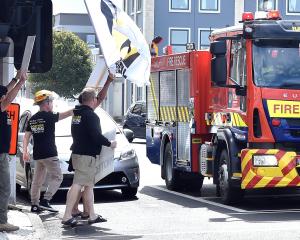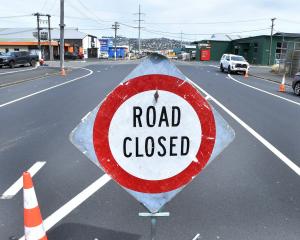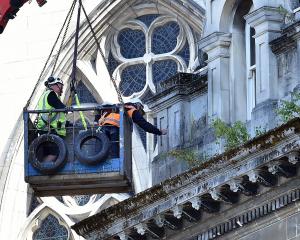
After heated debate between the three judges, they finally settled on Tuna Madness, a beautiful and vivid depiction of a tragedy at sea, invoking the power of nature and our ultimate powerlessness against it.
"New Chapters" — an ODT initiative in conjunction with Corrections, supported by the University Book Shop (UBS) — has prompted southern prisoners to pick up their pens and let their imaginations run wild.
This week the dozens of entries were published on the ODT website and readers voted in their droves for their favourites.
The People’s Choice award was almost as hotly contested as the overall prize, but in the final day of voting a more gentle portrayal of nature had a landslide victory.
The Plover, featured in last weekend’s ODT, was the overwhelming selection and readers as far away as the United States emailed in to give it their backing.
Judge and UBS general manager Phillippa Duffy was impressed with the standard of the work and reserved special praise for her chosen winner.
"Tuna Madness had some beautiful lines and imagery made all the more potent by the tension of the situation.
"The way the sea and the waves are a ‘bass rumble’ and the vibrations of a ‘deep, wordless threat’ stayed with me for days after I read it," she said.
"It captures a West Coast community at one of its most vulnerable and dangerous times, but the author refrains from making it melodramatic."
Corrections senior adviser of education programmes Hayley Bell also paid tribute to the author for the tension he built and the intricate way in which the story was told.
She and ODT assistant editor Paul Gorman were thrilled The Plover had won the public vote. He called it an "enchanting poem" with a heart-warming sentiment.
The winners will receive their prizes, courtesy of the UBS, at a ceremony at Otago Corrections Facility on Wednesday.
Next weekend’s ODT will feature interviews with both winners.

THE PLOVER
You caring for your little ones is such a sight to see
You keep them warm under your breast and keep them danger free
If they go too far foraging you call them back to you
And they come waddling back to mum in a single-file queue
Standing tall and looking out, you never miss a thing
Your eyes on one, the other hides beneath your gentle wing
I’ve seen them eating all day long, you haven’t had a bite
A sparrow comes along and you protect with all your might
The Southland winds they blow your perfect feathers all around
And I wonder why you’re standing there, firmly on the ground
I guess it’s because your little ones don’t have the strength to fly
But your song is telling them that all they need to do is try
They’re doing just as mother does, it’s nature at its best
The search for food draws to an end, it’s time to take a rest
As you do I notice that their dad is standing guard
He’s only small but bravely holds the threatening facade
It’s getting dark, it’s getting cold and soon it’s going to rain
You made it with your little ones through yet another day
So nestle up and keep them warm, the day will start again
And know that you’re the perfect mum, my little plover friend
TUNA MADNESS
It was a foul West Coast day, everything subdued by the ominous, foreboding, oppressively close clouds glowering down. Desperate, we decided to escape to the bottom of a couple of nasty flagons of apple cider.
Walking to the store under leaden skies is a wet affair. Arriving there, the deluge abates; we clearly hear the bass rumble of huge surf smashing itself relentlessly on the breakwater.
Gossip instore says "the tuna fleet awaits high tide"; due in hours enabling them to navigate the bar, come up river and unload their catch.
Trudging out to the unpretentious lighthouse on the end of a concrete block, the flagon passes back and forth in silent grimaces. Its warmth creeps from guts to tongue, we discuss the chances an acquaintance may die today. The river is on our left, ocean on the right, at the tip sits the lighthouse. Two stories tall, round, with white stucco, a red rood with a small round dome for the light sitting cherry-like on top. Halfway up is the small walkway encircling it.
We’re seated, backs against the door, watching waves roll past towards the beach. Each one is seemingly larger as the tide creeps in to assault the land, trying to resist its relentless savagery.
There’s a small crowd of loved ones gathered. Their fear is palpable, the air already heavy with worry. Knots of people gather and split as they constantly try to reassure themselves. But I see the hand-wringing and fearful, furtive glances as a particularly determined wave smashes itself on to the blocks in front of the lighthouse, the vibrations a deep, wordless threat.
Suddenly, a wave lurches over the foundations and splits around the lighthouse. White creamy froth joins up, inches deep across the road, sucking greedily at the living as the monster rolls up river. People look longingly one last time to sea, hoping for a glance of their vessel.
We climb drunkenly up to the walkway and watch waves reach upwards until they bash face first on to our small sanctuary until it’s an island.
The first of the tuna boats bobs on top of a wave, now again on the wave behind, lifted effortlessly twenty, thirty feet. We see it lurch forward, smoke whipped from its exhaust. It looks small on the face, carried forward over the bar and now beside us, level. The crewmen, life-jacketed, clinging on dearly but ready to leap clear. It sails past; we hear faintly his yell of triumph and join in.
Next up is a big steel vessel, riding low and heavy. It tries to catch a wave, its twin engines spewing exhaust silently. It fails to gather enough speed and it’s overtaken. The wave behind it is massive. We watch as it’s picked up, rising towards the crest, backwards. Slowly, it gathers speed back down the face, the white top chasing the stern hungrily.
The violent turmoil of the crest starts climbing on to the back of the boat; the crewman’s face a rictus of terror as he screams at the skipper. Relentlessly, water overwhelms it. Frothing sea washes around the deck, the boat starts to slew sideways, then, stern down, it begins to roll. The crewman leaps out, away from the deadly entanglements as the bow pirouettes before the red keel is exposed wrongly.
The river’s current drags it back out to sea while we stand helpless; shocked, silent witnesses.
Days later the boat is washed up, the skipper lost forever. We will never forget the sea’s demonstration of its merciless power that day.
Comments
I really enjoyed reading every entry. Each piece showed deep thought and maybe an insight to previous lives. It was difficult to choose a favourite and I send congratulations to each and every person who took part and hope this initiative is continued. Keep up the great work.












